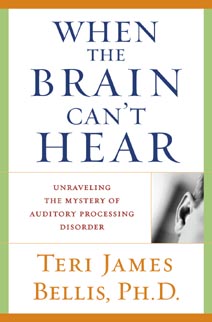Atria Books; 2003
Buy When the Brain Can’t Hear on Amazon.com >
Dr. Teri James Bellis, author of When the Brain Can’t Hear, is an audiologist who herself developed APD following an automobile accident. She clearly knows APD from the inside out. She has consulted on hundreds of children and adults with symptoms ranging from common difficulties involving the learning of “heard” information, to the unusual, such as marital problems resulting from improper processing of a mate’s tone of voice. Indeed, symptoms of APD can be so disparate that it’s easy to see why some doubt its existence.
When the Brain Can’t Hear pretty much covers the map on APD. Bellis uses a case study approach to elucidate the problem, liberally sprinkling stories of her patients throughout to show the many variations on this theme. She refers to these stories as the book takes us through initial descriptions, the pathophysiology of symptoms, and the impact of various types of APD on a person’s ability to make friends, learn, socialize, and cope. She explains how the diagnosis is made, treatments, approaches to living with APD, and how to negotiate the education and healthcare systems. Clearly a true believer, Bellis is likewise a discriminating one, repeatedly reminding the reader that while signs of APD can be misdiagnosed—as ADHD, dyslexia, hearing loss, forgetfulness, or sheer crankiness—many hallmark symptoms may not be due to APD.
This book is not for the easily distracted reader. It is exhaustive in its scope and detail. There are long lists of symptoms for every type of APD, plus a number of examples. Thus, this book is probably best read in pieces, with a focus on areas of personal interest to the reader, and saved for later reference. Interestingly, aside from physical and behavioral modifications to enhance listening and learning, Bellis only superficially discusses available treatments for APD. With many “listening” therapies now promoted online and elsewhere, it would have been useful to have some of them clarified and, if necessary, debunked
Reviewed by Jane Brown, MSW, Scottsdale, AZ



